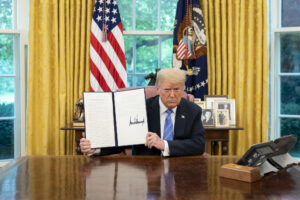She was forgetting only one thing. Last Thursday, after the European Council rejected her idea of a summit between the 27 and Vladimir Putin, Angela Merkel was not wrong to point out that no one had reproached Joe Biden for his tête-à-tête with the Russian president. By this she meant that Europeans had no reason to deny themselves what the Americans were doing, but the whole problem was that the United States was a state and the European Union was not.
When the American president sits down opposite Vladimir Putin, he is the United States, its foreign policy, its military power and its economic weight. Facing the Russian president, the 27 are only an economic giant with feet of clay because they have no common defence and do not even share a vision of how to proceed with him.
With 27+1, Vladimir Putin would have have the game all tied up for him, but that does not mean that the Europeans can do nothing but sanction his regime again and again.
Reacting against the annexation of Crimea or the poisoning of Alexei Navalny is good. It is necessary. It is even indispensable, but we must also act, and the best way to do so, perhaps the only way, would be to start by saying what relations we would like to establish with Russia and under what conditions.
We would have no difficulty in doing so, because with Russia we all want the same thing, we the Union, its 27 Member States and its 450 million citizens.
We want to be able to coexist and cooperate on a continent stabilised by respect for the borders that were born out of the break-up of the Soviet Union. We want Russia to acknowledge the end of its empire, as Austria and Turkey, France, Great Britain, Portugal, Belgium and the Netherlands have done.
We want Russia to stop interfering in the internal politics of the independent states that its former possessions became three decades ago. We want Russia to succeed in establishing the democracy to which its people aspire. We will support this aspiration by affirming our own democracy and our political solidarity with Russian democrats, but we wish to lay the foundations for economic, industrial and cultural co-operation with Russia as soon as it complies with the international obligations to which its signature commits it.
This is the proposal we are making to Russia.
We should make it publicly so that not a single Russian is unaware that we do not want to attack, encircle or threaten his country, but on the contrary, we are reaching out to him. Until real progress is made towards an understanding, we should not lift our sanctions. We should say so too, but we should start work today on an Address to Russia setting out our proposals and, as soon as it is published, we should mandate EU representatives to open discussions with the Russian leadership.
They too have conditions to put forward. Not all of them are necessarily illegitimate and we will have to take them into account in order to seek and find acceptable compromises. This definition of our objectives, the address to Russia and then negotiations – the Union should and could do this, but a 27+1 summit, no, Mrs Merkel, I’m sorry, but this was not the right idea.



